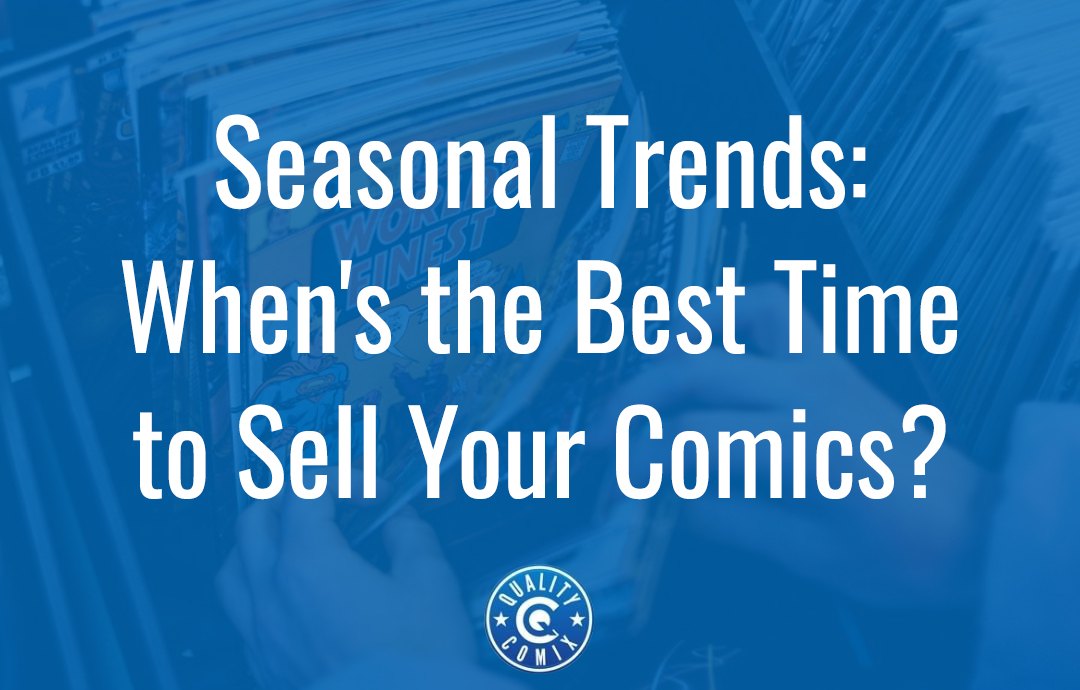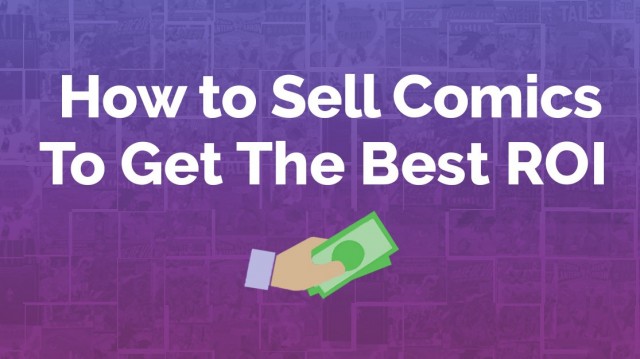
Some people buy comics so they can admire the art and issues they love. Some people buy them as a way to show off their love of comics as a whole or as a prestige display item. Many people buy them as an investment, and investments are only realized when you sell. So, that brings up the ever-relevant question: when should you sell?
Warren Buffet has a quote: "Time in the market is more important than timing the market." He's talking about stocks and other investments, but the core truth remains: the longer you hold an asset, the more it will generally be worth when you sell. It's not universally true – markets crash, especially collectibles markets, and comics have already gone through it once – but the core principle is the same.
The important part here, though, is the second part: timing the market. Picking the exact right moment to sell is often a fool's errand; you can never know how the next weeks, months, or years will go, and if you're always holding out for the greatest possible returns, you'll be holding forever until you're left holding the bag.
If that sounds gloomy, don't worry. There's no single rule of thumb for when you should sell your comics, but there are trends and stimuli that can make it a better choice to sell at a particular point. So, let's talk about different kinds of timing and when you might sell.
Table of Contents
The Best Time of Day to Sell Comics
Does the time of day you sell your comics matter?
Usually, not really. There are some minor influences, sure. Comic resellers are going to have patterns, and the times of day they buy are going to be relatively static, but unless you actually know those resellers, you probably won't be able to know or tell. Most of the time, when you're selling comics, you're doing so through an auction anyway, and that auction is likely to last multiple days or even weeks to get the most interest and bids. The exact hour you start – or that the auction ends – doesn't matter a whole lot when it comes to the final value of the comics.

The other thing to remember is time zones. Comics collectors are both national and international, which means there can be a ton of variance in the "ideal" timing. An ideal time for someone in California might not be the ideal time for someone in New York, which won't be the ideal time for an overseas collector in the UK.
The Best Day of the Week to Sell Comics
Unlike the time of day, the day of the week can matter, at least on a small scale.

There are a few schools of thought here.
- Schedule your auctions to end on Sunday afternoon. Sunday afternoon is the day and time when the largest proportion of people are going to be active. Since comic resellers and investors are looking for deals, they often look at auctions ending soon, so scheduling your auctions to end in that timeframe will get their eyes on it.
- Friday evenings could be good as well. Many Americans are paid on Fridays, and Friday evenings can be a time when they are flush with a new paycheck and ready to shop for their investments. Many people claim Sundays are better, though. Also, a huge number of Americans are paid bi-weekly, so every second Friday could be unbalanced.
There's also this quote from Verb-migration on the CGC forums:
"For some reason, if you use eBay, listing a seven-day auction between 6 p.m. and 9 p.m. Eastern time on the second and third Thursdays of the month has magical results."
Why? Who knows. Maybe it's a quirk of global populations, maybe it's something in eBay's algorithms, maybe it's just an odd experience that one user had and won't be reflected across the experience of others. Even in that same thread, some users claim Monday evenings are best, others say Tuesdays, and so on. Without an industry-wide study (or data directly from eBay, Heritage, or another vendor), it's hard to say for sure.
The Best Months of the Year to Sell Comics
Now, let's get into something a little more meaningful: seasonality and the months of the year.
There are naturally going to be seasonal trends just due to how human behavior works and how society is structured. So, when are the peaks likely to be?

There are a few options, such as:
- September through May. The winter months are a time when people are home, working, supervising children, and generally stuck. Summer has vacations, trips, and outdoor activities to distract potential buyers. Therefore, selling during the winter months is likely to get you more interest.
- October and November. These are the times of the year when people are buying comics as gifts, either for their family, children, or even just themselves. Being able to justify early Christmas gifts is a good way to encourage purchasing.
- March, April, and May. This is the time of year when income tax returns are coming in, and people flush with cash are looking to spend. Buying for just about everything kicks up, particularly around the end of April, for that reason.
There are also particular seasonal reasons why interest can be high or low, but I'll get into those in a bit since they're more tied to events than they are to seasons, and events can change.
The Best Years to Sell Comics
Is there a best year to sell comics?
Well, not really. You can't exactly say that 2021 was the best year, or that 2028 will be the best year or anything like that. Instead, there are three possibilities to mention.
The first is just a generic statement: the longer you hold, the better. In almost every case, the older a comic is, the more likely it is to be valuable and the more valuable it will be. In fact, I have a whole rundown on the age of comics and how it ties into value over here.

The caveat here is that the magic of the golden age is never coming back. Part of what makes the oldest and most popular golden age comics as valuable as they are is scarcity. They weren't considered investment products or durable goods back then, so they were used, abused, and discarded. On top of that, they were printed in much lower quantities than they are now. Those social and environmental factors are never coming back, and golden age comics are forever going to be the peak of value, in general.
The second possibility is significant dates and anniversaries. For example, Spider-Man was first introduced in August of 1962. That means that 2012 was the 50th anniversary of the introduction of Spider-Man and that 2062 will be the 100th anniversary. These can be significant dates, though often the date itself isn't going to be as important as the media and hype surrounding it coming from the publishers.
The third possibility, and the most common and predictable of the three, is the so-called 20-year marker. Someone who is reading and enjoying comics when they're young – 5-10 years old or thereabouts – is going to be around 25-30 when 20 years have passed. That's the age where two things tend to happen. First, nostalgia for childhood starts to kick in. Second, careers are starting, and disposable income is climbing. This combines to see a surge in interest in things after around 20 years, as young adults buy that nostalgia in an attempt to recreate those halcyon days.
Annual Events Affecting Sale Prices
Perhaps one of the biggest driving factors of annual swings in comic prices and interest is the slate of major events that happen throughout the year. There are a lot of these, some large, some small, and you're familiar with some of them. For example, San Diego Comic-Con, or SDCC, is an annual event held around the end of July.

Image source: CNN
Now, you might expect this to increase interest in comics, but it's actually kind of the opposite. Major events like SDCC tend to be tipping points for two reasons.
- In the weeks or months leading up to the event, people are saving up their disposable income with plans to attend. They might hope to buy merch and other goodies at the event, or maybe they want to get good deals in person. Whatever the reason, they hold off on purchasing.
- In the days and weeks after the event, hype is high. People have renewed interest in characters or comics they may have forgotten about or passed over and may seek out those comics to buy. Announcements also frequently happen at these events, but more on that in a bit. Finally, people who didn't find what they wanted at the convention might go and buy it online afterward.
This tends to happen with every comics-focused event, and the larger the event (and the more attendees), the larger the swing on the market.
Spiking Interest in Characters and Comics
The best time to sell a comic is always going to be when the interest is high. Common examples include:
- The reintroduction of a disused character in a new comic.
- A movie announced to adapt a popular comic or character.
- A new video game for a character.
- A new team-up or other grouping.
These can go hand-in-hand with things mentioned above, including anniversaries of the introductions of characters or, more often, major events like SDCC. Marvel and DC, as well as smaller publishers, often make new announcements at these big events, and that spurs on a lot of hype for whatever is announced.

Generally, an announcement is going to focus on certain key issues and trickle down from there. A major movie covering a specific story from the comics will spike interest most in the comics depicting that story but will also raise interest somewhat in comics related to those characters. There may also be a surge in popular stories after the key story, as speculation on what announcement might happen afterward.
The biggest challenge here is that these aren't events you can really time beyond being ready to pull the trigger and sell whenever an announcement happens. You don't get much forewarning about what is and isn't going to surge, and you can't predict anything about the market. You just have to watch it and be ready to list your comics when it happens.
Do Comic Prices Drop After Surges?
At the start, I mentioned the quote that time in the market is more important. Is that necessarily true with comics? Sort of.
Comics that experience surges in pricing tend to remain higher priced than they were before, but the peak of the surge will be higher than whatever price they settle at. A comic that sells for $300 before the surge might sell for $700 at the peak, but after the surge is over, it might stabilize around $500. To an extent, you can see this in action by looking at price histories and seeing the difference between one-year peaks and 90-day averages.

Comic prices are, however, at least a little self-sustaining. Think about it. How do you pick the price for a comic? You look at recently completed auctions and pick a price in the same ballpark. Then, if yours sells, you become another data point for someone else to pick the same or a higher price point. There's not a lot of incentive to sell for less than a price point proven to sell, after all.
Liquidating an Investment
Unfortunately, one of the biggest driving factors for selling off comics is often simply the pressures of life. Losing a job, unexpected medical expenses, or even the collector passing away and you inheriting the comics can all mean you're going to want to sell them potentially sooner rather than later, and pricing isn't going to be foremost on your mind.

To that end, your other option is to sell your collection in bulk. We buy collections like that, as well as single key issues and other valuable comics. If you're interested, just reach out!



